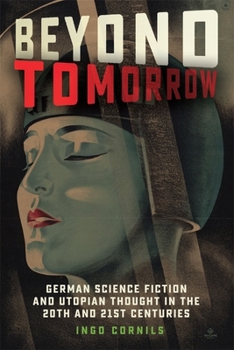Beyond Tomorrow: German Science Fiction and Utopian Thought in the 20th and 21st Centuries
Shows German Science Fiction's connections with utopian thought, and how it attempts Zukunftsbew ltigung: coping with an uncertain but also unwritten future.
Since its beginnings, German Science Fiction (or SF) has engaged with social change and technological progress, often drawing from utopian thought. The writer Kurd La witz challenged the authoritarian Wilhelmine order; later, film director Fritz Lang provided a searing critique of Weimar society. Meanwhile utopian thinkers like Ernst Bloch and Herbert Marcuse insisted on the possibility of hope, even in the face of totalitarianism. During the Cold War, German utopian writing and filmmaking were vital both as a warning and as a creative imagining of possible futures. More recently, as rapid scientific and technological advances have continued, literary and cinematic responses have become increasingly dystopian in outlook, reflecting fears connected with globalization, advances in artificial intelligence and genetic engineering, and persistent challenges like climate change, hunger, migration, and terrorism.
This book explores German SF's responses to the question how humanity can match technological advances with social, ethical, and moral progress. It surveys German utopian thought and the German SF tradition-both literary and cinematic-providing close readings of selected works that paradoxically reflect boundless optimism for the possibility of change and increasing pessimism in its likelihood. English translations are provided throughout. Building on its rich tradition but now confidently entering the mainstream, German SF attempts Zukunftsbew ltigung: coping with an uncertain but also unwritten future.
Since its beginnings, German Science Fiction (or SF) has engaged with social change and technological progress, often drawing from utopian thought. The writer Kurd La witz challenged the authoritarian Wilhelmine order; later, film director Fritz Lang provided a searing critique of Weimar society. Meanwhile utopian thinkers like Ernst Bloch and Herbert Marcuse insisted on the possibility of hope, even in the face of totalitarianism. During the Cold War, German utopian writing and filmmaking were vital both as a warning and as a creative imagining of possible futures. More recently, as rapid scientific and technological advances have continued, literary and cinematic responses have become increasingly dystopian in outlook, reflecting fears connected with globalization, advances in artificial intelligence and genetic engineering, and persistent challenges like climate change, hunger, migration, and terrorism.
This book explores German SF's responses to the question how humanity can match technological advances with social, ethical, and moral progress. It surveys German utopian thought and the German SF tradition-both literary and cinematic-providing close readings of selected works that paradoxically reflect boundless optimism for the possibility of change and increasing pessimism in its likelihood. English translations are provided throughout. Building on its rich tradition but now confidently entering the mainstream, German SF attempts Zukunftsbew ltigung: coping with an uncertain but also unwritten future.
Format:Hardcover
Language:English
ISBN:1640140352
ISBN13:9781640140356
Release Date:September 2020
Publisher:Camden House (NY)
Length:332 Pages
Weight:1.60 lbs.
Dimensions:1.0" x 6.1" x 9.1"
Customer Reviews
0 rating





